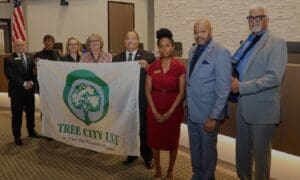2012 regional transportation tax would export Fayette money with little in return, PTC mayor charges
Should Fayette County withdraw from participating in the Atlanta Regional Commission and instead become part of the more rural Three Rivers Commission, which includes Coweta and Spalding counties among others south of metro Atlanta?
Peachtree City Mayor Don Haddix says emphatically yes, especially if Fayette residents don’t want to get lumped into a regional taxation scheme that he says would result in more Fayette money leaving the county than would ever return. He makes that case in a column on Page A5.
Fayette County Commission Chairman Jack Smith and Fayetteville Mayor Ken Steele disagree, contending such a move would cause Fayette to lose a seat at the big table involving metro transportation issues.
Haddix said Tuesday that a switch from the Atlanta Regional to the Three Rivers Commission will be considered by the city councils in Peachtree City, Tyrone and Brooks this month.
As for the Fayette County Board of Commissioners, Haddix said he knows incoming commissioners Steve Brown and Allen McCarty, who will be sworn in in January, are in favor of his proposal. He also suggested that recent anti-transit comments from commissioners Eric Maxwell and Herb Frady make it possible that the commission could also vote soon to make the switch to Three Rivers instead of the commission waiting until January.
Presuming the move wins favor at those levels, the matter will be up for a final decision by the Georgia legislature, Haddix explained.
In an interview Tuesday, Haddix lamented the fact that Peachtree City’s golf cart paths don’t qualify for funding under the regional transportation tax that will be voted on in 2012.
The rush is on to make the switch promptly so Fayette won’t be lumped in with metro Atlanta and — according to Haddix — get the short end of transportation funding if a regional transportation sales tax is approved in 2012 for the metro Atlanta area.
“We have no congestion points, no proposals for down here, not anything,” Haddix said of the state’s regional transportation plans.
Haddix also said that at a recent regional transportation meeting, DOT officials “just flatly admitted there’s nothing in this for Fayette” in terms of reaping beneficial projects in Fayette County that would be funded by the regional transportation sales tax funds.
Fayette Chairman Smith and Fayetteville Mayor Steele argue that leaving ARC would leave Fayette without a voice in regional transportation issues, which is critical since some 60 percent of Fayette residents commute into Atlanta each workday. Smith also said that in a more rural regional commission area, Fayette would be looked upon as a “metro” county by the remaining more rural counties, putting Fayette in a poor position from a regional cooperation standpoint.
“They want us to be like the southern counties that are rural in nature, but 60-plus percent of the population in Fayette County commutes out of the county to work and they don’t go south, west or east. They go north,” Smith said. “Our citizens are more in tune to metro Atlanta than they are to rural areas.”
ARC, meanwhile, has provided Fayette with funding for Livable Centers Initiative projects in Peachtree City and Fayetteville of more than $1 million each, and another $400,000 in funding comes to Fayette Senior Services thanks to ARC, Steele and Smith said in separate interviews Tuesday with The Citizen.
Meanwhile it costs Fayette County a bit over $100,000 for its annual dues to ARC, officials said.
Smith added that ARC does not dictate transportation projects for individual counties and cities, but does have a responsibility of making sure the region’s projects meet federal air quality standards. If not, the projects must be tweaked until they can meet the air quality guidelines, Smith said.
If those projects aren’t modified, the region will lose its federal funding for transportation initiatives, Smith added.
Even if Fayette left ARC, it would still have to meet the air quality standards, because for the purpose of getting federal funding, Fayette will remain part of “metro Atlanta,” Smith said.
“If Fayette County is not a member of the ARC, it will still be subject to dictates for transportation without a voice at the table or a vote in the outcome,” Smith said.
Smith added that if you take out the three largest counties in the ARC, the remaining seven counties that are most similar to Fayette County are able to out-vote the three mega counties. Fayette would not enjoy a similar advantage in the Three Rivers Commission, Smith said.
“We’re inextricably bound to the Atlanta area,” said Steele. “There are numerous advantages to being in the ARC. Comparatively, those advantages don’t exist in Three Rivers.”
One project which qualifies for metro Atlanta regional sales tax funding that would affect Fayette commuters is the intersection of Ga. Highway 74 North at Interstate 85, Haddix said.
Haddix contends that development around the area has contributed largely to the congestion problems, so it should be Fairburn’s responsibility to fix it. He acknowledged that many of the commuters flowing through the road at drive time on workdays are Fayette residents, but many are also from Coweta, he added.
One solution would be to add road projects in Coweta to enhance their access to the Interstate so they won’t have to use Hwy. 74, Haddix said.
As it stands now, even if Fayette voters disapprove the regional 1 percent tax at the polls, if the aggregate vote total among the 10-county area gains more than 50 percent of the vote, the tax would be assessed here and throughout the region. In other words, Fayette would get stuck with the tax even if a majority of Fayette voters were against it.
Fayette would still face the same scenario if it switches to the Three Rivers area, but Haddix contends the county will be better positioned to get funding for needed transportation projects, even though the pool of funding will be much smaller. Such a regional T-SPLOST is defined by the boundaries of the regional commissions.
The projects that qualify for funding by the regional transportation sales tax must be approved by a regional roundtable of local elected officials, and Haddix is Fayette’s representative on the roundtable.
The sales tax would kick back 15 percent of its revenues to be divvied up among the 10-county metro area, with those funds eligible to be spent on non-regional projects of each county’s choosing, ARC officials have said.
Haddix in his column contends that Fayette will never get back the money it sends to the bigger counties’ projects.
The switch to Three Rivers is not a done deal. It will require a majority vote representing the governing bodies of more than 50 percent of the total cities’ combined populations and also a majority vote by the Fayette County Commission, Haddix said.
If those hurdles are crossed, the matter goes to the Georgia legislature for approval. Haddix said the legislature’s track record for approving such changes is 100 percent.
“The ARC goals are buses and trains among other things,” Haddix said, although a link he provided to a 2007 powerpoint shows no bus, train or rail service coming to Fayette County under what is referred to as a “premium expansion concept” for the region’s transit systems.
Haddix also pointed out that the 2007 plan includes an “outer loop” around metro Atlanta that would go through Fayetteville and most likely a portion of north Fayette County.
But since that plan was hatched, transportation funds have dried up in the recession and the region is struggling to find funding to maintain the existing road network, much less coming up with funding for such massive new projects. A project as ambitious as an outer loop around metro Atlanta would certainly run into the multi-billion-dollar range, and the regional sales tax is projected to raise $7-8 billion within its 10-year lifespan.
Haddix contends that state transportation officials want the tax to last at least 30 years to have a significant impact, but that will require voters re-approving the tax twice following the initial approval.
— Additional reporting by Ben Nelms











Leave a Comment
You must be logged in to post a comment.